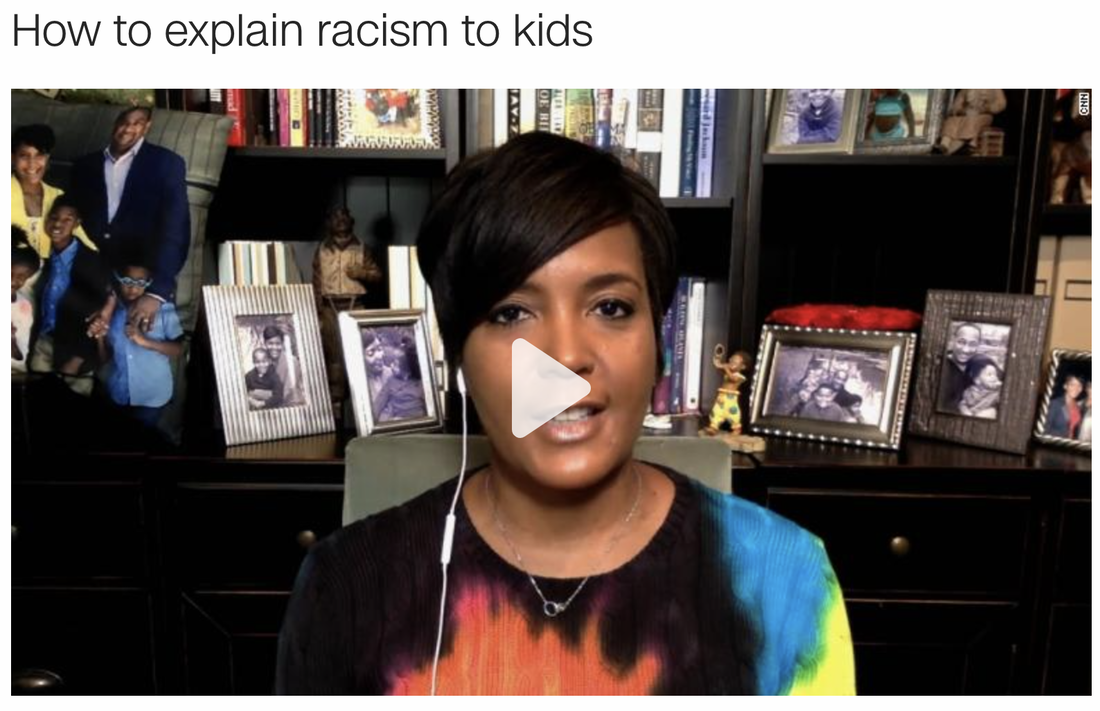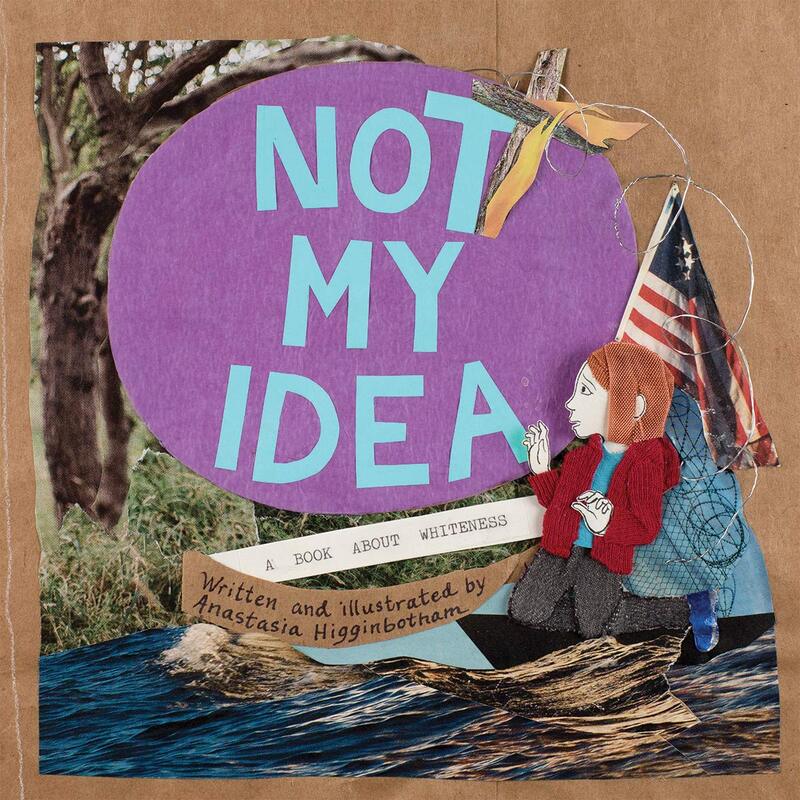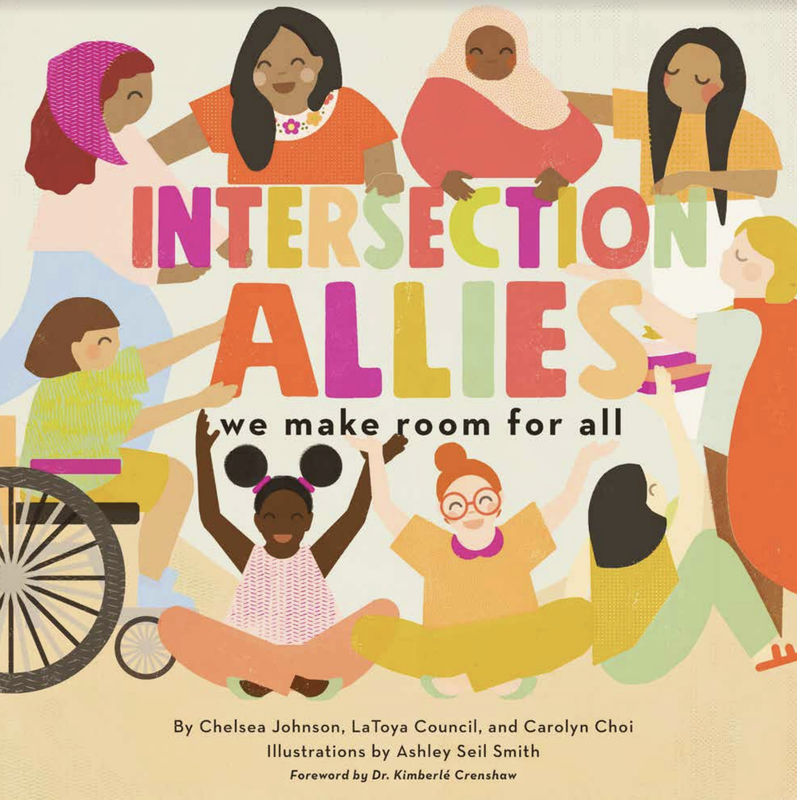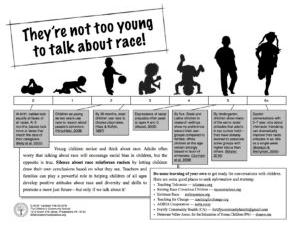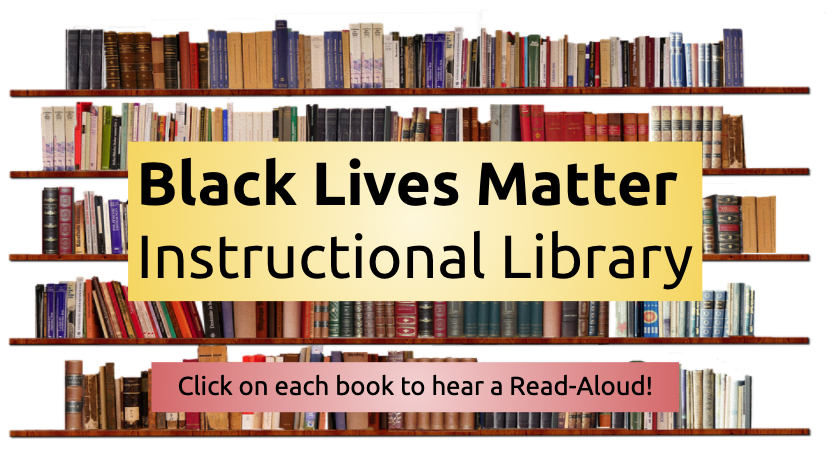Where do we start?
recognizeNPR: "Raising White Kids" Author On How White Parents Can Talk About Race (7 minutes)
INFORM OUR YOUTH |
Talking to Kids about violenceHigh profile acts of violence, particularly in schools, can confuse and frighten children who may feel in danger or worry that their friends or loved-ones are at risk. They will look to adults for information and guidance on how to react. Parents and school personnel can help children feel safe by establishing a sense of normalcy and security and talking with them about their fears. Read more at NASP.org
ACCEPT that there's a problem (reading for adults)American Psychological Association: Talking to Kids About Discrimination
National Museum of African American History & Culture (Smithsonian): Talking About Race Robin DiAngelo deconstructs white privilege (best for older folks because it's abstract)
|
ExploreTime to start talking (and listening!): Betsy Brown Braun, Child Development Expert: Talking to Kids About the Riots, Racism, and Law Enforcement (In Light of George Floyd's Killing in Minneapolis)
Online library (incluso español) |
For more... this is not a new problem.
Sometimes children want more information than we are able to share or that we actually know. Here are some phrases that might help.
Helpful LinksLinks are from Center for Racial Justice in EducationInterviews/Advice from Experts:
- “It sounds like you are sad” (angry, confused, frustrated, etc).” (affirming feelings)
- “I don’t know the answer to that.” (if you don’t or if you are not sure: then focus back on feelings)
- “It’s hard when we don’t know all the facts.” (truth telling but not stating more than we’re able to tell)
- “We have to respect the privacy of those affected.” It’s not our news to tell and people will share their news in their way and in their own time.
- “There are a lot of ways to feel and they are all okay.” Sometimes you might feel one way and then you might feel another way later on.
- “There is no one right way to feel or to act after someone dies.”
- “What would you like to do right now (who would you like to talk to) that might help?”
- Most often, what people want most is someone to talk to about their experience:
- Someone to care
- Someone to really listen
- Someone to lean on or cry with
- How to let people know you are listening
- Actively listen when someone needs to talk: turn toward the speaker, speak calmly, listen more than speak, summarize, reflect.
- Make eye contact if appropriate and strive for a warm facial expression
- Listen more, talk less
- Your compassionate presence is more important than your words.
- Try not to interrupt.
- When you do speak, do it in a calm, warm tone
- Label, summarize, and mirror the feelings the other person is expressing.
- Do ask questions to clarify.
- Things NOT to say
- I know how you feel.
- Let’s talk about something else.
- You should work toward getting over this.
- You are strong enough to deal with this.
- I know how you feel. (But it’s okay to say, “I feel sad too.”)
- You’ll feel better soon.
- You need to relax.
- Also, don’t judge. Questions like “Why?” and “Why not?”and evaluating the worth of what someone else did or didn’t do don’t help.
- Shock/denial
- Restlessness, anger, aggressive behavior
- Sleeping or eating difficulties
- Headaches, tummy aches, body aches
- Withdrawal
- Sadness, tearfulness
- Poor concentration
- Unexpected fears and worries
- Acting younger than their age
- School avoidance
Helpful LinksLinks are from Center for Racial Justice in EducationInterviews/Advice from Experts:
- Talking to Children after Racial Incidents from the Penn GSE Newsroom
- Supporting Kids Of Color In Wake Of Racialized Violence from EmbraceRace
- Tips for Parents on Media Coverage from the National Child Traumatic Stress Network
- Talking to Children about the Shooting from the National Child Traumatic Stress Network
- An Activity Book For African American Families: Helping Children Cope with Crisis from the National Black Child Development Institute (NBCDI) and the Eunice Kennedy Shriver National Institute of Child Health and Human Development (NICHD)
- 10 Quick Ways to Analyze Children’s Books For Racism and Sexism, Council
on Interracial Books for Children - Talking to kids about discrimination, American Psychological Association
- What White Children Need to Know About Race, Ali Michael and Eleonora Bartoli
- Talking to Kids about Racial Stereotypes – Tip Sheet, Media Smarts
- Resources for Discussing Police Violence, Race, and Racism With Students by Evie Blad
- Teaching About Race, Racism and Police Violence from Teaching Tolerance
- 100 Race-Conscious Things you can Say to your Child to Advance Racial Justice from Raising Race Conscious Children
- Talking to Kids About Racism and Justice: a list for parents, caregivers & educators from the Oakland Public Library
- Resources for Educators Focusing on Anti-Racist Learning and Teaching from the Early Childhood Education Assembly
- A Collection of Resources for Teaching Social Justice, Jennifer Gonzalez.
- 60+ Resources for Talking to Kids About Racism, Lorien Van Ness
- Talking About Racism And Bias: Resources For Parents And Caregivers, Children’s Alliance
- Racial Justice Resources for Families, Massachusetts Conference United Church of Christ
- Talking to Children About Race and Ethnicity, Institute for Learning & Brain Sciences
- Discussing Difficult Situation with Your Children, National PTA
- Talking to Kids about Racial Violence, by Haig Chahinian
- The Conversation We Must Have with Our White Children by Courtney E. Martin
- Little Pitchers Have Big Ears: Helping Children Deal with Tragedies by Cabinet of Curiosities LLC
- Talking to Kids about Current Events and Conflicts from Lee & Low Books
- How should teachers and parents talk to kids about police violence? by Emma Brown
- 4 Things We Should All Teach Kids About Racism Right Now by Mia McKenzie
- In the Turmoil Over Race and Policing, Children Pay a Steep Emotional Price by Yamiche Alcindor
- too great a burden to bear by Sabrina Joy Stevens
- What White Children Need to Know about Race by Ali Michael and Eleonora Bartoli
- Teaching Tolerance: How white parents should talk to their young kids about race by Melinda Wenner Moyer
- 5 Tips for Talking About Racism With Kids by Sasha Emmons
- Race Talk: Engaging Young People in Conversations about Race and Racism by Anti-Defamation League
- Here’s How To Raise Race-Conscious Children by Erin Winkler
- Your 5-year-old is already racially biased. Here’s what you can do about it by Andrew Grant-Thomas
- Talking to Children About Race, Policing and Violence by New York Times
- Why I teach my 2-year-old about race by Michelle Acker Perez
- It’s Never Too Early to Talk About Race by Sarah Butler
- Black Parents in Baton Rouge on How They’re Talking to Kids about Police Brutality by Taryn Finley
- Talking with Kids about Racism is an Act of Kindness and and Act of Freedom by Emma Redden

